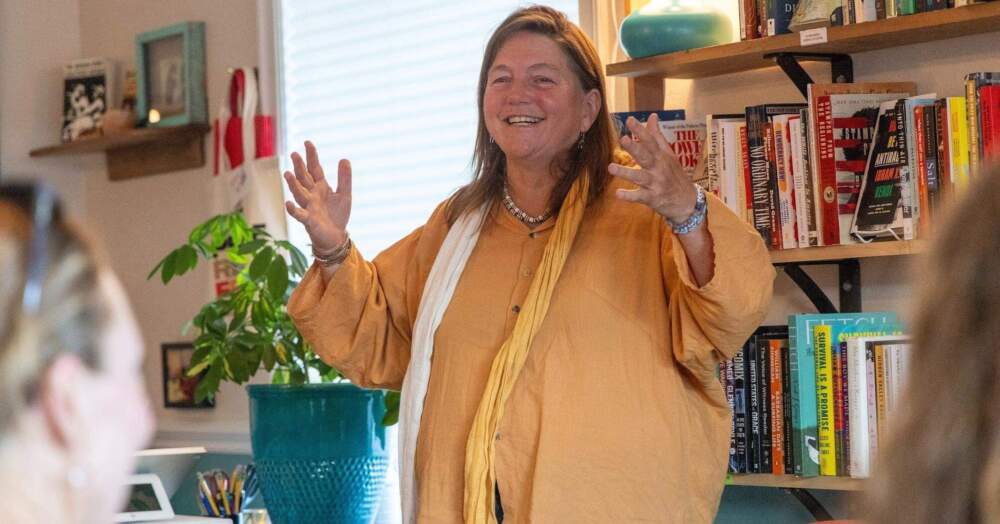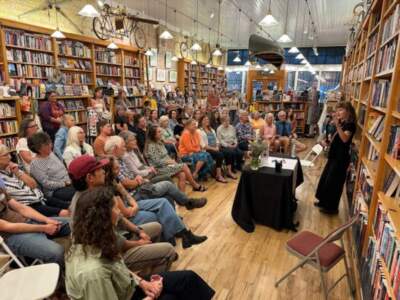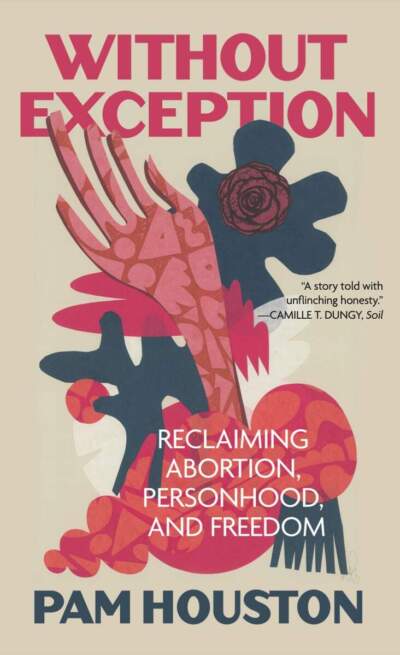Advertisement
Commentary
'Joy, in fact, is a platform. Every woman knows this'

Editor’s note: Pam Houston is an author. Her latest book, “Without Exception: Reclaiming Abortion, Personhood, And Freedom” tells the story of how her personal and professional life was powered by access to abortion. It also examines the legal and political history of reproductive rights in the United States. In the essay below, Houston shares her experience on tour, introducing readers to the book. It’s followed by an excerpt, chapter one of "Without Exception." — Cloe Axelson
What I did not expect was how much laughter there would be in the room.
The tears, I expected. The confessions.
I knew that in bright blue Marin County women would shout their abortions. In deeply red San Luis Valley in Colorado, I expected that each woman who spoke would first glance behind her at the door. I anticipated the terror in the eyes of women old enough to remember what it was like before Roe v. Wade. They had memories of how childbearing was used as an excuse to keep women out of power everywhere, from politics to the halls of academic science, from the boardrooms of industry and off of “best of” lists in the arts.
I knew that those same older women would share their frustrations: “I cannot believe we are still talking about this all these decades later.” I knew that for every man in attendance there would be about 30 women, that some nights there would be zero men in attendance, and that the average age of attendees would be older than one might guess givens whose freedoms are currently at stake.
I knew that some of those women, the ones in my age bracket, would not be ready to believe me when I suggested they might let go of the shame that was never theirs to begin with. This is the shame that causes them to stay with men who hurt them, that causes high blood pressure and cancer, that keeps them from speaking up and stepping up, and living with clarity and joy.

As I tour bookstores and meeting places across the country, I have been thinking a lot about how women, especially women of my generation, took up the burden of shame, almost as if it was some new wonder diet. I remember thinking at one point, maybe in the late ‘90s, that shame was the most overused word in the English language, which is a way of saying I personally resisted this generalized version, at least at first, until I started to feel I was living on an island of shamelessness all by myself.
Abortion-driven shame is its own category, of course. That’s because of some (but not most) religions. And because viability outside of the womb is, while logical, not irrefutable as the moment when life begins.

Here it makes sense to pause over the difference between guilt and shame, how guilt, at least in my experience, rises up from within me, and shame gets imposed from without. I felt guilty that I had to terminate three pregnancies over the course of my reproductive life, that my best efforts at birth control let me down exactly that many times. But I still managed to hold shame at bay, more or less, until sometime in my early 40s, when a female massage therapist told me she could see a number of “bubble babies” floating in the air around me. She told me I would never be well until I let them go to heaven. This woman was a complete stranger, who worked at a hotel spa. I had not told her about my abortions or anything else. I cannot say for certain now whether she knew the number was three. So that encounter wrecked me for a little while. Not because I believed in the existence of the bubble babies, not exactly, but because she saw the shame I had yet to admit to myself was there.
Two decades later, my research for “Without Exception” revealed that more than 95% of women who were granted a desired abortion still believed they made the right decision for themselves and their families five and 10 years on. And even more recently, as I listened to Sen. J.D. Vance tell me and the nation exactly what women are good for at various ages, I know my initial resistance to shame was the correct impulse. That shame, if you follow it back far enough, always belongs to the patriarchy, who is terrified of all mysteries, and therefore must quantify them, commodify them, monetize them.
Advertisement
But I am so tired of talking about all of that.
What I want to talk about is the laughter of women in the rooms and bookstores where my readings take place. Because no matter how big or small the crowd at these events, there are at least a few women, sometimes a great many, who have let go of their shame or are ready to.
Laughter is a full-throated articulation of independence and sisterhood, the soundtrack of freedom and hope.
These women shake their heads in recognition when I admit that when I sat down to write the book, I was not absolutely certain whether I’d had two or three abortions. They understand that if we live long enough, even our most self-critical voices run out of energy, and looking back over a life of equal parts ecstasy and suffering, laughing with our girlfriends is often how we got through. The realization behind the laughter, is that women have a lot of s--- to get done if we are, in fact, going to save the world, or at least keep it rolling a little longer. We don’t have time for shame anymore. We don’t have any more energy to waste on the shame that keeps us from stepping into our full power.
If Kamala Harris wins this election, it will be because of the bright star millions of women can feel expanding in their chests every time she laughs in the face of her opponent’s fear- mongering and hatred. It will because of her full repertoire of laughters: hilarity, happiness, surprise, delight, the one that fills her eyes with tears, the one with the sob just underneath it.
Joy, in fact, is a platform. Every woman knows this. Women laugh in the face of adversity and terror because they know it is the first step on the path out of paralysis, the first step on the road back to direct action. Laughter is a full-throated articulation of independence and sisterhood, the soundtrack of freedom and hope.
Book Excerpt: "Beyond Exception: Reclaiming Abortion, Personhood, And Freedom"
By Pam Houston
Chapter 1: Lifespan of a Human Right

For forty-nine years, five months, and two days, the United States Supreme Court protected a woman’s right to have an abortion. In other words, it protected a woman’s right to determine what happens inside her own body, and in the long winding road of her future, and in the shape of her one precious life, in the case of unwanted pregnancy. It protected this right whether she was twelve years old and had been raped by her father or another male relative, whether she was twenty-two and date raped after she’d had her cocktail drugged in a bar the first time she spent a summer interning at a non-profit in a big city, whether she was forty-two and happily married and already had four children and the family budget was stretched beyond manageability, whether she was dedicatedly single and entirely career focused and had thrilling unprotected sex with strangers every chance she got.
Those forty-nine years, five months, and two days happen to correspond almost exactly to the span of my reproductive life. I got my first period at eleven years old in January of 1973, the same month Jane Roe took her case against the state of Texas to the Supreme Court. As of last year, I am now, and only just now, fully in menopause, after what seemed like the longest perimenopausal decade in the history of the universe—a decade of joint aches, night sweats, and flashes of rage so intense it was like one minute I was a woman and the next minute I was a cheetah. It was also a decade of coming to terms with myself.
For my entire reproductive life, the government of the country of which I am a citizen, supported by the highest court in the land, protected my body sovereignty, which is more than they did for my mother. And which is more than they would do for my daughter, if I had one, which I do not, nor a son, because I did not want children, I never wanted children, and I was free to have an abortion. More than one. I was free to have the three abortions I needed over the course of my reproductive life, and did so: one in my twenties, one in my thirties, one at forty-one.
Excerpted from "Without Exception" by Pam Houston. Copyright © 2024. Excerpted by permission of Pam Houston and Torrey House Press. No part of this excerpt may be reproduced or reprinted without permission.
Follow Cognoscenti on Facebook and Instagram. And sign up for our weekly newsletter.
